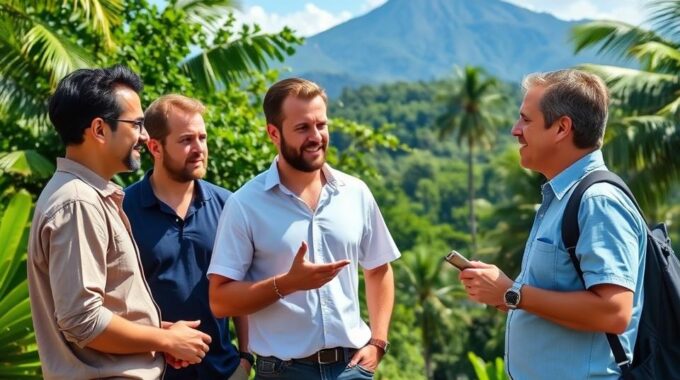Discover expert home equity loan advice for Costa Rica property in our ultimate guide. Learn how to secure funds with competitive rates and flexible terms.

Start a Business in Costa Rica: Passion to Profit With GAP Equity Loans
Ever thought about turning your passion into a business in Costa Rica? Starting a business here is more than just following your dreams. It’s about using financial tools like GAP Equity Loans to make your vision real. Costa Rica offers many chances for entrepreneurs, but you need to know how to find the right funding.
Let’s see how you can make your passion profitable and start your business today.
Key Takeaways
- Understanding the importance of GAP Equity Loans for funding your business.
- Key strategies to identify profitable business ideas in Costa Rica.
- Insights into the entrepreneurial ecosystem and government support.
- The significance of effective property valuation for securing loans.
- Comparative analysis of different loan options available for startups.
- Learning from successful entrepreneurs who have thrived in Costa Rica.
Understanding the Costa Rican Business Landscape
The business scene in Costa Rica is lively and welcoming for those starting new ventures. The cost of living here is about 30% lower than in the United States. This makes it a great place to start a business. The area is full of startups and small to medium-sized businesses.
The Growing Entrepreneurial Ecosystem
Costa Rica is a great place for entrepreneurs thanks to many support programs. Laws like Law 9996 offer tax breaks, including no taxes on imports and income from abroad. The government helps local businesses grow by making it easier to start and innovate.
There are many ways to earn a living, like freelancing, remote work, and traditional jobs. This makes it easy for people to find work.
Key Economic Indicators
Small and medium businesses play a big role in the economy, adding a lot to the GDP. Taxes on property are lower for locals, making real estate attractive. The high demand for tourism also boosts rental income, creating good business opportunities.
While the infrastructure is reliable, it’s smart to check on services like electricity, water, and internet before starting a business.
Government Support for Startups
The government really supports starting businesses in Costa Rica. There’s a visa for foreign investors who put at least $200,000 into a business or property. There’s also a visa for those with $60,000 or a steady income.
There are many chances to meet others and find investors at events like Expo PYME and job fairs. The expat community is also very supportive, offering help and advice.
GAP Equity Loans: A Pathway to Funding
GAP equity loans offer a special financial help for entrepreneurs in Costa Rica. They help get the money needed to start or grow a business. Knowing how these loans work can show their value as a funding option.
What are GAP Equity Loans?
GAP equity loans help by filling the gap between property equity and business funding needs. They use home equity to get a lot of capital. For many in Costa Rica, these loans are a simple way to get funds with flexible payback plans. They are among the top loan choices in Costa Rica.
Eligibility Requirements for GAP Equity Loans
To get GAP equity loans, you must meet certain requirements. These include:
- Proof of income and financial stability
- A minimum credit score, typically around 650
- Valid property appraisal showing enough equity
- A clear business plan for how the funds will be used
Meeting these criteria boosts your approval chances. It also helps get better loan amounts and interest rates.
Loan Amounts and Interest Rates
Loan amounts for GAP equity loans usually range from $50,000 to $1,000,000. Interest rates start at about 12%. This makes them a good choice for many entrepreneurs. The competitive rates help manage finances while growing the business.
How to Start a Business in Costa Rica and Turn Your Passion into Profit
Starting a business in Costa Rica is an exciting journey. I want to share practical steps to help you find small business ideas that match your skills and passions. It’s important to understand local market needs to find profitable opportunities. This guide will also cover how to navigate the registration process and comply with the costa rica business regulations.
Identifying Profitable Business Ideas
To start, think about what services or products are in demand in your community. Ideas include eco-tourism ventures and organic farming, which are great in a country rich in biodiversity. Market research will show you where your unique skills can meet a need. Talking to local entrepreneurs can give you ideas and inspiration for small business ideas in Costa Rica.
Steps to Register Your Business
After you have your business idea, it’s time to register. Here are the steps:
- Choose a business name and check if it’s available.
- Pick a legal structure (like sole proprietorship or partnership).
- Get the documents you need, like your ID and proof of address.
- Register with the National Registry and get a tax ID number.
- Open a business bank account to manage your money well.
Navigating Costa Rican Business Regulations
It’s crucial to understand the rules for businesses in Costa Rica. This includes labor laws, tax rules, and any special permits you might need. Knowing these rules helps you follow them and grow your business. I suggest talking to other local entrepreneurs to learn from their experiences. This can help you understand the rules better.
Utilizing Your Property as Collateral
Using your property as collateral in Costa Rica can open up big financial doors. You can get bigger loans and maybe even lower interest rates. It’s key to know how property value and loan-to-value ratios work if you want to use this method.
Understanding Property Valuation
In Costa Rica, property value is based on location, size, and demand. Places like Guanacaste or Jaco are more expensive because of tourism. Knowing this value is important because it affects how much you can borrow.
Loan-to-Value Ratios Explained
Loan-to-value ratios (LTV) are key in figuring out loan costs. LTV is the loan amount divided by the property’s value. A lower LTV means better loan terms. Lenders usually want an LTV of 80% or less. Knowing this can help you make better choices.
Benefits of Using Your Home as Security
Using your home as security has many benefits. It makes it easier to get loans, even if banks say no. You can also borrow more money to reach your financial goals, like starting a business or paying for school. For more info on equity loans, check out GAP Equity Loans.
Using your property for loans can be a smart financial move in Costa Rica. Many people use it to pay off debt, fix up their homes, or start new projects.
Comparing Loan Options in Costa Rica
Finding the right loan in Costa Rica can be tough, with so many choices. Knowing the different loans is key for entrepreneurs. I’ll explain the common loans and how to pick the best one for your startup.
Types of Loans Available
There are several types of loans to consider:
- Construction Loans: These loans are for building projects. They often have lower rates and easier rules. Look for private lenders for better deals.
- Equity Loans: Good for those with property, equity loans let you use your asset’s value. Private investors offer these, making them easier to get than bank loans. Learn more at this link.
- Personal Loans: These loans cover many expenses and are often not secured. They might have higher rates but are good for small needs.
Best Loan Options for Startups
For startups, consider these:
- Gap Equity Loans: They offer custom funding for construction and equity loans. They promise fast access to funds and flexible terms.
- Local Banks: They might be stricter but offer reliable options for personal loans or lines of credit.
- Private Lenders: They are flexible and a great choice for construction or equity loans. They stand out in the costa rica loan comparison.
In summary, knowing your needs and the loan types can help find the right loan in Costa Rica. This approach helps choose the best financing for your business goals.
Managing Loan Costs with GAP Equity Loans
When I think about managing loan costs in Costa Rica, I focus on understanding loan fees and ongoing expenses. GAP Equity Loans can help finance my business, but I need to know the costs. These include origination fees, closing costs, and ongoing charges that add up over time.
Understanding Loan Fees and Costs
To manage loan costs well, I need to know about different loan fees. Common ones are:
- Origination fees
- Closing costs
- Documentation fees
- Monthly service charges
These costs can increase, affecting my financial planning. It’s crucial to review loan agreements carefully to spot and negotiate fees. Knowing the costs helps me budget better.
How to Budget for Repayment
Budgeting for repayment needs careful planning and foresight. I make a detailed plan that includes monthly payments and possible fee increases. Here’s how I do it:
- Check my total monthly income from all sources.
- Make a list of all expenses, separating them into needs and wants.
- Set aside a fixed amount each month for loan repayment, treating it as a must.
Using these methods helps me prepare for loan repayments and focus on business growth. Good budgeting for repayment reduces financial stress and helps me reach my business goals.
Success Stories: Entrepreneurs Thriving in Costa Rica
Every entrepreneur dreams of turning their passion into profit. In Costa Rica, many have made this dream come true. Their stories are inspiring, showing how they overcame challenges and found success.
One story stands out. It’s about someone who went from traveling the world to starting successful businesses in Costa Rica. This shows how adventure and business can go hand in hand.
Case Study: Transforming Passion into Business
This person started traveling at 19 and ran nine businesses for 15 years. They made millions online in just ten years. Their journey began with a travel blog in 2013, which took two years to make its first hundred dollars.
A viral post brought them 10,000 followers, changing their life. The blog sparked a passion for sharing experiences and growing businesses. They focused on places where money could go further, aiming to build something big.
Going to Venezuela was a turning point, gaining them fame in travel and business.
Lessons Learned from Successful Ventures
This entrepreneur’s story teaches us a lot:
- Persistence Pays Off: Starting small can lead to big success after years of effort.
- Audience Engagement: Connecting with people can boost your brand and open doors.
- Adaptability: Success in different markets, like Costa Rica, is key.
Groups like FUNDES show how businesses can thrive, even when it’s tough. After the pandemic, they faced big challenges but now support startups in Latin America with about $10 million in business.
If you want to start a business, there are resources to help. Check out GAP Investments to make your dream a reality. Join the successful entrepreneurs in Costa Rica.
Conclusion
Starting a business in Costa Rica is now easier than ever. Law No. 9996 has made it possible with a lower investment of $150,000. GAP Equity Loans offer a way to get loans in Costa Rica, using your home equity.
Turning your passion into profit is within reach. Costa Rica’s economy offers great opportunities. I suggest looking into GAP Equity Loans for your business needs. Taking the first step towards your dream business is just a call away.
Call Now To See If You Qualify For a Loan
It’s time to take the leap! Whether you dream of a business in tourism, agriculture, or tech, getting funds is key. Don’t wait—reach out today for advice that fits your goals. Let’s talk about how to use available resources to make your vision a reality. For more on GAP Equity Loans and to see if you qualify, visit this guide.
Source Links
- https://acumen.org/entrepreneurs/
- https://www.codebtech.com/bridging-the-sme-financing-gap-by-leveraging-fintech/
- https://www.worldbank.org/en/country/costarica/overview
- https://www.coldwellbankersamara.com/article/how-to-make-a-living-in-costa-rica
- https://www.specialplacesofcostarica.com/blog/how-to-start-a-business-in-costa-rica-as-an-american/
- https://www.coldwellbankertamarindo.com/article/how-to-earn-a-stable-income-in-costa-rica
- https://gap.cr/costa-rica-education-system/
- https://virtuzone.com/blog/reasons-to-start-a-business/
- https://ranchomastatal.com/blognewsletter/permaculture-entrepreneurshipnbsp-navigating-the-path-from-student-to-professional
- https://dgec.mep.go.cr/wp-content/uploads/2024/06/INGLES-BACHILLERATO-POR-MADUREZ.pdf
- https://laurajanehaver.com/become-a-passionate-and-prosperous-freedompreneur
- https://www.donna-stone.com.au/12-different-ways-get-money-business/
- https://www.cliftonpf.co.uk/blog/01082024180924-revenue-based-financing/
- https://www.specialplacesofcostarica.com/blog/how-to-get-a-mortgage-in-costa-rica/
- https://www.costaricaexpattours.com/our-blog/
- https://crie.cr/teacher-immigration-to-costa-rica/
- https://gojo.co/what-is-financial-inclusion
- https://lifestyleinvestor.com/don-wenner-real-estate-loans/
- https://www.foodbevy.com/2024-grant-opportunities/
- https://www.thebrokebackpacker.com/broke-backpacker-to-serial-entrepreneur/
- https://www.imd.org/news/i-am-mission-driven-and-profit-orientated/
- https://lifespringcounseling.net/small-business-owners-retreat-in-costa-rica
- https://quatro.legal/relocation-to-costa-rica-how-to-immigrate-to-pura-vida-country/
- https://quatro.legal/i-am-looking-to-invest-in-costa-rica-and-thinking-of-becoming-a-resident-how-can-i-obtain-an-investor-temporary-residency-inversionista/
- https://www.sandandshores.com/2024/02/04/benefits-of-owning-a-business-19-first-hand-experiences/
Article by Glenn Tellier (Founder of CRIE and Grupo Gap)



